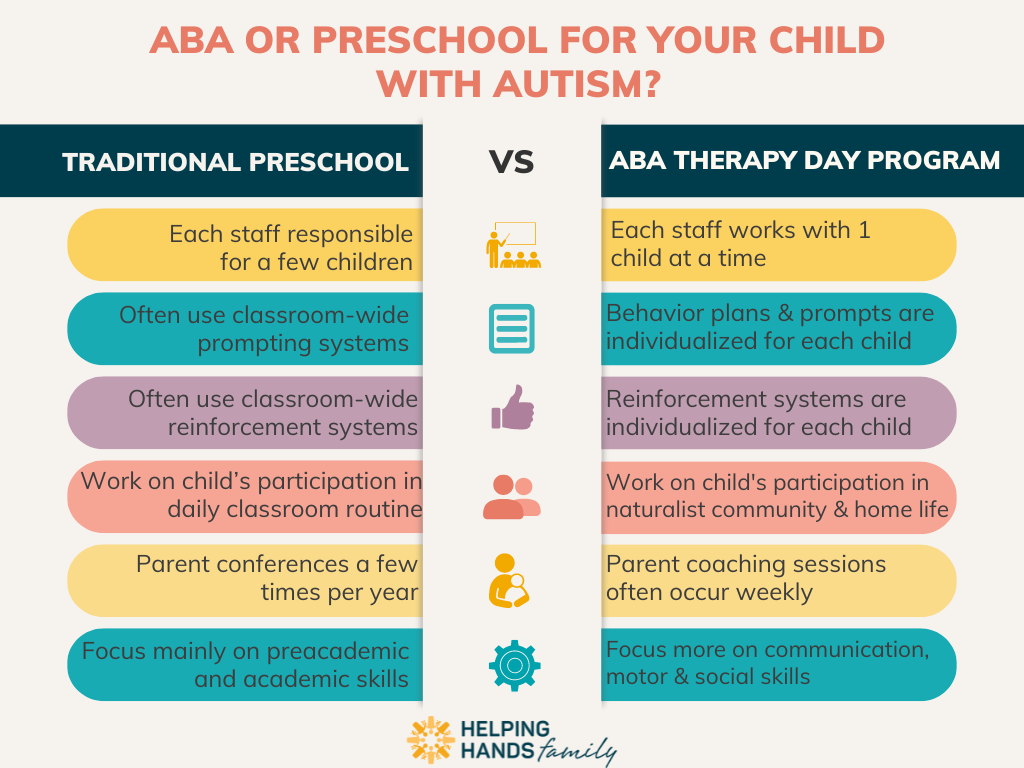ABA Therapy Program vs. Traditional Preschool
Choosing between ABA therapy and traditional preschool can feel overwhelming, but it’s all about finding the right match for your child’s unique strengths and needs — no path is wrong. Remember, if you choose an ABA approach, it may just a stepping stone to traditional school.
As a parent, you want nothing more than to give your child every opportunity to flourish. We’re here to help!
Can ABA Substitute for Preschool?
Absolutely! ABA therapy can either stand in for preschool or serve as a stepping stone toward it. Many ABA programs focus on building critical skills for a smooth transition into school.
How ABA therapy can prepare your child for a successful preschool transition:
- Develops attention and focus by learning to sit, listen, and engage in structured activities.
- Strengthens communication by encouraging need expression or socialization with words, signs, or devices.
- Builds social confidence through practicing sharing, turn-taking, and group play.
- Promotes emotional regulation by reducing challenging behaviors with coping skills.
- Establishes routines in practicing transitions, following schedules, and listening to directions.

Check out more helpful tips below to reduce learning regression and build towards developmental achievements:
What Your Child Needs Most: Tailored Support vs. Group Learning
Every child with autism is different—and so is their path to success. When deciding between ABA therapy and a traditional preschool setting, it’s essential to consider your child’s individual strengths, challenges, and developmental needs.
For building foundational skills, some children may thrive in a group learning environment, while others need one-on-one support that is more personalized Here’s a breakdown of key factors to consider:
Autism Support Request
Complete the form to receive outreach from our support team.
Social Interaction Challenges
Children with autism often need help developing the skills to engage meaningfully with peers and adults. If your child struggles to initiate or maintain social interactions, an ABA program may be better suited to:
- Providing direct support for developing social skills
- Using structured environments for practice and feedback
- Focusing on individualized goals like sharing, turn-taking, and emotional expression
Consider each program’s curriculum and student-to-teacher ratio.
Academic Readiness & Foundational Skills
Before entering a traditional classroom, some children with autism benefit from targeted teaching to build core skills such as:
- Expressive language and labeling
- Matching and sequencing
- Understanding functions and reasoning
- General knowledge and observational learning
ABA therapy uses personalized autism treatment built to your child’s current level and learning style. This makes it easier to address academic gaps before transitioning to a classroom.
Behavior, Eating, and Potty Training Needs
Challenges like self-injurious behaviors, food aversions, or delayed potty training, can impact your child’s learning in a preschool setting. Individualized sessions can be more effective as ABA therapists can use strategies like:
- Positive reinforcement
- Play-based sessions
- Visual supports and prompts
- Step-by-step routines for independence
Training & Expertise in Traditional Schools
While many preschool teachers are skilled and dedicated, they may not have specialized training in autism support. This lack of training can make it hard for educators to recognize whether their teaching strategies are effective for children on the spectrum.
That’s why consistent communication between parents, therapists, and educators is critical. By working together, you can ensure your child receives the support they need—whether in a therapy setting, school, or a blend of both.
How Much Support Does Your Child Need?
Both a school environment and ABA Therapy have their own benefits. Consider your child’s unique needs when deciding between traditional school and an ABA therapy. The main factor driving this decision is the amount of support your child needs and the curriculum offered in each option.
Some final factors to consider are:
- Student to teacher ratio - ABA therapy offers one dedicated therapist working with each child rather than a crowded classroom.
- Personalized curriculum - In ABA, individualized behavior plans are used instead of a classroom-wide approach.
- Parent Communication - Weekly parent coaching happens in ABA versus bi-annual parent conferences.

In the end no choice is a bad choice, but one option may better fit your child’s needs! If you have any questions about your decision, please reach out to our Helping Hands Family team! We would be happy to answer any questions you may have about this important decision.
